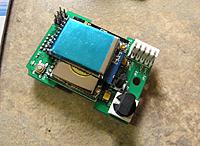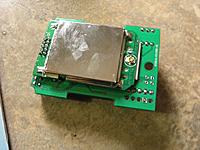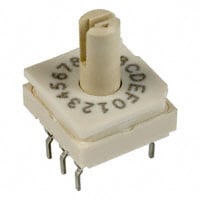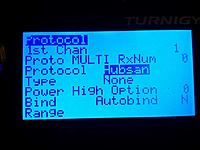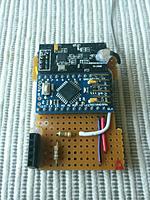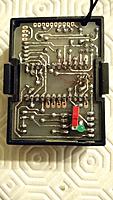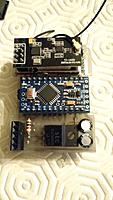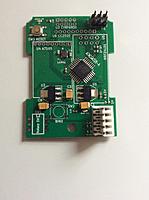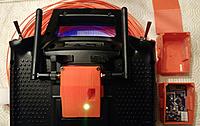DIY-Multiprotocol-TX-Module
Multiprotocol is a TX module which enables any TX to control lot of different models available on the market.
##Compatible TX
###Using standard PPM output (trainer port) The multiprotocol TX module can be used on any TX with a trainer port.
Channels order is AETR by default but can be changed in the source code.
The protocol selection is done via a dip switch or a rotary dip switch for access to up to 15 different protocols.
###Using a serial output The multiprotocol TX module can be used on a Turnigy 9X, 9XR, 9XR Pro, Taranis, ... running er9x or ersky9X. (A version for OpenTX is being looked at)
Using this solution does not need any modification of the TX since it uses the TX module slot PPM pin for serial transfer.
Channels order is AETR by default but can be changed in the source code.
This enables full integration using the radio GUI to setup models with all the available protocols options.
Options are:
- Protocol and type: many main protocols have variants
- RX Num: number your different RXs and make sure only one model will react to the commands
- Power: High or low, enables to lower the power setting of your TX (indoor for example).
- Option: -127..+127 allowing to set specific protocol options. Like for Hubsan to set the video frequency.
- Bind: bind a RX/model
- Autobind: Yes or No. At the model selection (or power applied to the TX) a bind sequence will be initiated
- Range: test range by setting the transmission power to the lowest value
Note:
- there are 2 versions of serial protocol either 8 or 16 channels. 16 channels is the latest version. Make sure to use the right version based on your version of er9x/ersky9x.
###Telemetry Telemetry is available for er9x and ersky9x TX. There are only 2 protocols so far supporting telemetry: Hubsan and Frsky.
To enable telemetry on Turnigy 9X or 9XR you need to modify your TX following one of the Frsky mod like this one.
##Protocols
###TX ID Each protocol is using a 32bits ID generated randomly at first power up. There are little chances to get a duplicated ID.
It's possible to generate a new ID using bind button on the Hubsan protocol during power up.
###Bind To bind a model press the bind button, apply power and then release.
###Protocol selection
####Using the dial for PPM input
| Dial | Protocol | Sub_protocol | RF Module |
|---|---|---|---|
| 0 | Select serial | ||
| 1 | FLYSKY | Flysky | A7105 |
| 2 | HUBSAN | - | A7105 |
| 3 | FRSKY | - | CC2500 |
| 4 | HISKY | Hisky | NRF24L01 |
| 5 | V2X2 | - | NRF24L01 |
| 6 | DSM2 | DSM2 | CYRF6936 |
| 7 | DEVO | - | CYRF6936 |
| 8 | YD717 | YD717 | NRF24L01 |
| 9 | KN | - | NRF24L01 |
| 10 | SYMAX | SYMAX | NRF24L01 |
| 11 | SLT | - | NRF24L01 |
| 12 | CX10 | CX10_BLUE | NRF24L01 |
| 13 | CG023 | CG023 | NRF24L01 |
| 14 | BAYANG | - | NRF24L01 |
| 15 | SYMAX | SYMAX5C | NRF24L01 |
Notes:
- The dial selection must be done before the power is applied.
- The protocols and subprotocols can be personalized by modifying the source code.
####Using serial input with er9x/ersky9x
| Protocol | Sub_protocol | RF Module |
|---|---|---|
| Flysky | A7105 | |
| Flysky | ||
| V9x9 | ||
| V6x6 | ||
| V912 | ||
| Hubsan | A7105 | |
| Frsky | CC2500 | |
| Hisky | NRF24L01 | |
| Hisky | ||
| HK310 | ||
| V2x2 | NRF24L01 | |
| DSM2 | CYRF6936 | |
| DSM2 | ||
| DSMX | ||
| Devo | CYRF6936 | |
| YD717 | NRF24L01 | |
| YD717 | ||
| SKYWLKR | ||
| SYMAX2 | ||
| XINXUN | ||
| NIHUI | ||
| KN | NRF24L01 | |
| SymaX | NRF24L01 | |
| SYMAX | ||
| SYMAX5C | ||
| SLT | NRF24L01 | |
| CX10 | NRF24L01 | |
| CX10_GREEN | ||
| CX10_BLUE | ||
| DM007 | ||
| CG023 | NRF24L01 | |
| CG023 | ||
| YD829 | ||
| Bayang | NRF24L01 |
Note:
- The dial should be set to 0 for serial which means all protocol selection pins should be left unconnected.
###Protocol details Extended limits supported: -125%..+125% can be used and will be transmitted. Otherwise the default is -100%..+100% only.
Autobind protocol: you do not need to press the bind button at power up to bind, this is done automatically.
####BAYANG Autobind protocol
| CH1 | CH2 | CH3 | CH4 | CH5 | CH6 | CH7 | CH8 | CH9 | CH10 | CH11 | CH12 | CH13 | CH14 | CH15 | CH16 |
|---|---|---|---|---|---|---|---|---|---|---|---|---|---|---|---|
| A | E | T | R | FLIP | HEADLESS | RTH |
####CG023 Autobind protocol
| CH1 | CH2 | CH3 | CH4 | CH5 | CH6 | CH7 | CH8 | CH9 | CH10 | CH11 | CH12 | CH13 | CH14 | CH15 | CH16 |
|---|---|---|---|---|---|---|---|---|---|---|---|---|---|---|---|
| A | E | T | R | FLIP | LIGHT | PICTURE | VIDEO | HEADLESS |
#####Sub_protocol YD829
| CH5 | CH6 | CH7 | CH8 | CH9 |
|---|---|---|---|---|
| FLIP | PICTURE | VIDEO | HEADLESS |
####CX10 Extended limits supported
| CH1 | CH2 | CH3 | CH4 | CH5 | CH6 | CH7 | CH8 | CH9 | CH10 | CH11 | CH12 | CH13 | CH14 | CH15 | CH16 |
|---|---|---|---|---|---|---|---|---|---|---|---|---|---|---|---|
| A | E | T | R | FLIP | MODE | PICTURE | VIDEO | HEADLESS |
MODE: +100%=mode3 or headless for CX-10A, -100%=mode1, 0%=mode2
####DEVO Extended limits supported
| CH1 | CH2 | CH3 | CH4 | CH5 | CH6 | CH7 | CH8 | CH9 | CH10 | CH11 | CH12 | CH13 | CH14 | CH15 | CH16 |
|---|---|---|---|---|---|---|---|---|---|---|---|---|---|---|---|
| CH1 | CH2 | CH3 | CH4 | CH5 | CH6 | CH7 | CH8 |
####DSM2 Extended limits supported
| CH1 | CH2 | CH3 | CH4 | CH5 | CH6 | CH7 | CH8 | CH9 | CH10 | CH11 | CH12 | CH13 | CH14 | CH15 | CH16 |
|---|---|---|---|---|---|---|---|---|---|---|---|---|---|---|---|
| A | E | T | R | CH5 | CH6 | CH7 | CH8 |
####FLYSKY Extended limits supported
| CH1 | CH2 | CH3 | CH4 | CH5 | CH6 | CH7 | CH8 | CH9 | CH10 | CH11 | CH12 | CH13 | CH14 | CH15 | CH16 |
|---|---|---|---|---|---|---|---|---|---|---|---|---|---|---|---|
| A | E | T | R | CH5 | CH6 | CH7 | CH8 |
#####Sub_protocol V9X9
| CH5 | CH6 | CH7 | CH8 |
|---|---|---|---|
| UNK | LIGHT | PICTURE | VIDEO |
#####Sub_protocol V6X6
| CH5 | CH6 | CH7 | CH8 | CH9 | CH10 | CH11 | CH12 |
|---|---|---|---|---|---|---|---|
| FLIP | LIGHT | PICTURE | VIDEO | HEADLESS | RTH | XCAL | YCAL |
#####Sub_protocol V912
| CH5 | CH6 |
|---|---|
| BTMBTN | TOPBTN |
####FRSKY Extended limits supported
Telemetry enabled for A0, A1, RSSI
Option=fine frequency tuning, usually 0 or -41 based on the manufacturer boards
| CH1 | CH2 | CH3 | CH4 | CH5 | CH6 | CH7 | CH8 | CH9 | CH10 | CH11 | CH12 | CH13 | CH14 | CH15 | CH16 |
|---|---|---|---|---|---|---|---|---|---|---|---|---|---|---|---|
| CH1 | CH2 | CH3 | CH4 | CH5 | CH6 | CH7 | CH8 |
####HISKY
| CH1 | CH2 | CH3 | CH4 | CH5 | CH6 | CH7 | CH8 | CH9 | CH10 | CH11 | CH12 | CH13 | CH14 | CH15 | CH16 |
|---|---|---|---|---|---|---|---|---|---|---|---|---|---|---|---|
| A | E | T | R | GEAR | PITCH | GYRO | CH8 |
GYRO: -100%=6G, +100%=3G
####HK310
| CH1 | CH2 | CH3 | CH4 | CH5 | CH6 | CH7 | CH8 | CH9 | CH10 | CH11 | CH12 | CH13 | CH14 | CH15 | CH16 |
|---|---|---|---|---|---|---|---|---|---|---|---|---|---|---|---|
| T | R | AUX | T_FSAFE | R_FSAFE | AUX_FSAFE |
####HUBSAN Autobind protocol
Telemetry enabled for battery voltage only
Option=vTX frequency (H107D) 5645 - 5900 MHz
| CH1 | CH2 | CH3 | CH4 | CH5 | CH6 | CH7 | CH8 | CH9 | CH10 | CH11 | CH12 | CH13 | CH14 | CH15 | CH16 |
|---|---|---|---|---|---|---|---|---|---|---|---|---|---|---|---|
| A | E | T | R | FLIP | LIGHT | VIDEO |
####KN
| CH1 | CH2 | CH3 | CH4 | CH5 | CH6 | CH7 | CH8 | CH9 | CH10 | CH11 | CH12 | CH13 | CH14 | CH15 | CH16 |
|---|---|---|---|---|---|---|---|---|---|---|---|---|---|---|---|
| A | E | T | R | DR | THOLD | IDLEUP | GYRO3 |
GYRO3: -100%=6G, +100%=3G
####SLT Autobind protocol
| CH1 | CH2 | CH3 | CH4 | CH5 | CH6 | CH7 | CH8 | CH9 | CH10 | CH11 | CH12 | CH13 | CH14 | CH15 | CH16 |
|---|---|---|---|---|---|---|---|---|---|---|---|---|---|---|---|
| A | E | T | R | GEAR | PITCH |
####Symax Autobind protocol
| CH1 | CH2 | CH3 | CH4 | CH5 | CH6 | CH7 | CH8 | CH9 | CH10 | CH11 | CH12 | CH13 | CH14 | CH15 | CH16 |
|---|---|---|---|---|---|---|---|---|---|---|---|---|---|---|---|
| A | E | T | R | FLIP | PICTURE | VIDEO | HEADLESS |
####V2X2
| CH1 | CH2 | CH3 | CH4 | CH5 | CH6 | CH7 | CH8 | CH9 | CH10 | CH11 | CH12 | CH13 | CH14 | CH15 | CH16 |
|---|---|---|---|---|---|---|---|---|---|---|---|---|---|---|---|
| A | E | T | R | FLIP | LIGHT | PICTURE | VIDEO | HEADLESS | MAG_CAL_X | MAG_CAL_Y |
####YD717 Autobind protocol
| CH1 | CH2 | CH3 | CH4 | CH5 | CH6 | CH7 | CH8 | CH9 | CH10 | CH11 | CH12 | CH13 | CH14 | CH15 | CH16 |
|---|---|---|---|---|---|---|---|---|---|---|---|---|---|---|---|
| A | E | T | R | FLIP | LIGHT | PICTURE | VIDEO | HEADLESS |
##Hardware
###RF modules Up to 4 RF modules can be installed:
- A7105 for Flysky, Hubsan
- CC2500 for Frsky
- CYRF6936 for DSM2, DSMX, DEVO, Walkera
- NRF24L01 for Hisky, V2x2, CX-10, SYMAX and plenty other protocols
RF modules can be installed for protocols need only. Example: if you only need the Hubsan protocol then install only a A7105 on your board.
You also need some antennas and cables.
###Microcontroller The main program is running on an ATMEGA328 running @16MHz and 3.3V. An Arduino pro mini can be used to build your own Multimodule.
Using stripboard:
Using a home made PCB:
or build your own board using SMD components and an associated PCB:
###Schematic
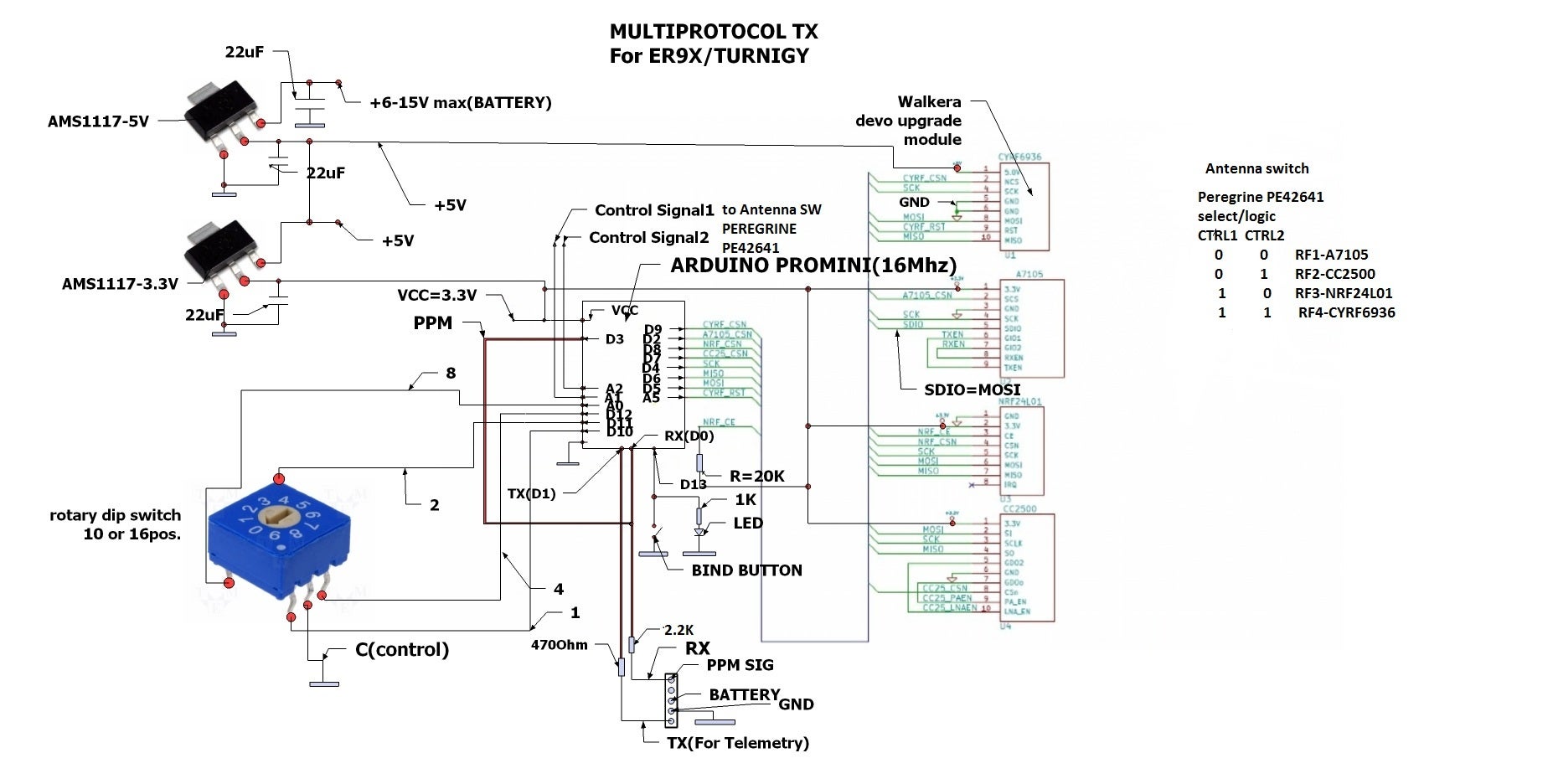 Attention: All modules are 3.3V only, never power them with 5V.
Attention: All modules are 3.3V only, never power them with 5V.
###Radio integration You can 3D print your box (details here):
##Compilation
###Toolchain Arduino 1.6.5
Compilation of the code posted here works. So if it doesn't for you this is a problem with your setup, please double check everything before asking.
Multiprotocol.ino header can be modified to compile with/without some protocols, change protocols/sub_protocols associated with dial for PPM input, different channel orders, different channels timing, 8 or 16 channels serial protocol, Telemetry or not, ...
###Upload the code using ISP (In System Programming) It is recommended to use an external programmer like USBASP to upload the code in the Atmega328. The programmer should be set to 3.3V or nothing to not supply any over voltage to the multimodule and avoid any damages.
From the Arduino environment, you can use this shortcut to compile and upload to the module: Skecth->Upload Using Programmer (Ctrl+Maj+U)
###Set fuses Use a tool like AVR Burn-O-Mat to set the fuses of the Atmega328 to:
- Low Fuse 0xFF
- High Fuse 0xD2
- Extended Fuse 0x05
This will make sure your ATMEGA328 is well configured and the global TX ID is not erased at each updates.
##Troubleshooting
###LED status
- off: program not running or a protocol selected with the associated module not installed.
- slow blink: serial has been selected but no valid signal has been seen on the RX pin.
- fast blink: bind in progress.
- on: normal operation.
###Bind Make sure to follow the following procedure: press the bind button, apply power and then release it after 1sec. The LED should be blinking fast indicating a bind status and then fixed on. It's normal that the LED turns off when you press the bind button, this behavior is not controlled by the Atmega328.
###Protocol selection For serial, leave all 4 selection pins unconnected. For PPM, connect 1 to 4 of the selection protocol pins to GND. The protocol/mode selection must be done before the power is applied.
